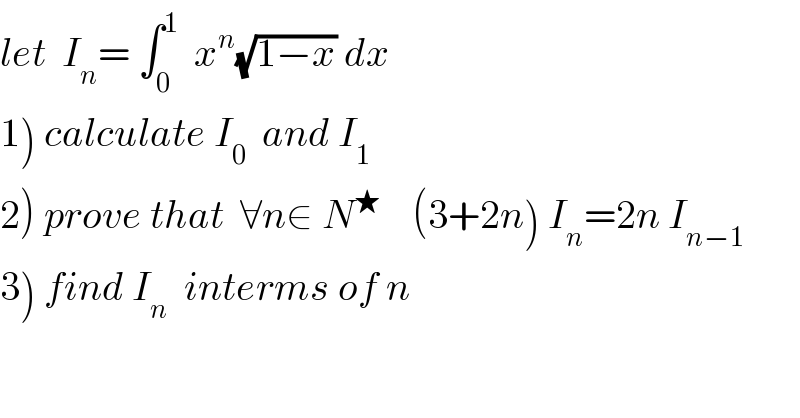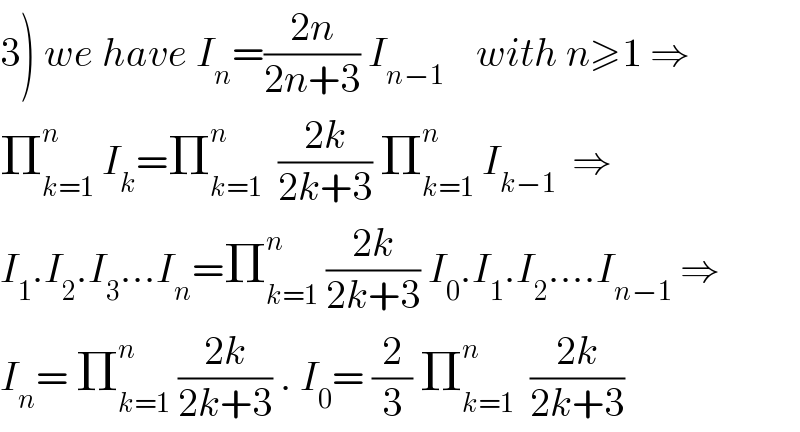
Question and Answers Forum
Question Number 40139 by maxmathsup by imad last updated on 16/Jul/18

Commented by prof Abdo imad last updated on 20/Jul/18
![1) I_0 =∫_0 ^1 (√(1−x))dx =_(x=sin^2 t) ∫_0 ^(π/2) cost 2sint cost?dt =2 ∫_0 ^(π/2) sint cos^2 t dt =2[−(1/3) cos^3 t]_0 ^(π/2) =−(2/3){0−1}=(2/3) I_1 = ∫_0 ^1 x(√(1−x))dx =_((√(1−x))=t) −∫_0 ^1 (1−t^2 )t(−2tdt) =2 ∫_0 ^1 t^2 (1−t^2 )dt =2 ∫_0 ^1 (t^2 −t^4 )dt =2 [(t^3 /3) −(t^5 /5)]_0 ^1 =2{(1/3) −(1/5)}=2(2/(15)) =(4/(15))](Q40358.png)
Commented by maxmathsup by imad last updated on 24/Jul/18
![2) changement (√(1−x))=t give 1−x=t^2 I_n = ∫_0 ^1 (1−t^2 )^n t 2tdt = ∫_0 ^1 2t^2 (1−t^2 )^n dt =_(t=sinα) ∫_0 ^(π/2) 2sin^2 α cos^(2n) α cosα dα = ∫_0 ^(π/2) 2sin^2 αcos^(2n) α dα by parts u^′ =sinα cos^(2n) α and v=2sinα I_n = [−(1/(2n+1)) cos^(2n+1) α 2sinα]_0 ^(π/2) −∫_0 ^(π/2) −(1/(2n+1))cos^(2n+1) α .2cosα dα =(2/(2n+1)) ∫_0 ^(π/2) cos^(2n+2) α dα = (2/(2n+1)) ∫_0 ^(π/2) (1 −sin^2 α)cos^(2n) α dα = (2/(2n+1)) ∫_0 ^(π/2) cos^(2n) α dα −(1/(2n+1)) ∫_0 ^(π/2) 2sin^2 α cos^(2n) α dα =(2/(2n+1)) ∫_0 ^(π/2) (1−sin^2 α)cos^(2(n−1)) α dα −(1/(2n+1)) I_n ⇒ (1+(1/(2n+1))) I_n = (2/(2n+1)) ∫_0 ^(π/2) cos^(2(n−1)) α dα −(1/(2n+1)) I_(n−1) ⇒ ((2n+2)/(2n+1)) I_n = (2/(2n+1)) ∫_0 ^(π/2) cos^(2(n−1)) α dα −(1/(2n+1)) I_(n−1) ...be continued...](Q40611.png)
Commented by maxmathsup by imad last updated on 24/Jul/18

